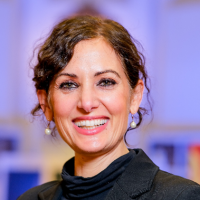AGI News
Naika Foroutan, DAAD/AGI Research Fellow

Naika Foroutan
Humboldt-Universität zu Berlin
Dr. Naika Foroutan is a DAAD/AICGS Research Fellow from September to December 2022.
She is Professor of Integration Research and Social Policy at the Institute of Social Sciences (ISW) at Humboldt-Universität zu Berlin where she heads the Berlin Institute on Integration and Migration Research (BIM). She is also director of the German Center for Integration and Migration (DeZIM) a research center funded by the German Federal Ministry for Family Affairs, Senior Citizens, Women and Youth (BMFSFJ) that produces empirical analyses on migration, integration, and racism in Germany. She is also a consultant for German political parties and civil society organizations.
Dr. Foroutan's research focuses on the analysis of discourses, attitudes, and policies in nation-states that are transforming into immigration countries. She examines the impact of pluralization on norms and values as well as on attitudes and policies related to migration and integration. She studies the transformation of collective and national identities as well as racism and conflicts related to minorities in pluralistic democracies with a particular focus on Islam and Muslims. She has published widely on Muslim identities and anti-Muslim attitudes in countries of immigration as well as on Islamism and radicalization. Her empirical studies on "East-Migrant Analogies" gained considerable attention by comparing East Germans with migrants and testing for effects on anti-Muslim racism. The empirical study was followed by her most recent book, The Society of Others, which she published together with journalist Jana Hensel.
Dr. Foroutan has also been leading in developing a new theoretical and critical approach to reinterpreting plural societies through the lens of post-migration. For this theory-building she has gained wide recognition and visibility and has been awarded several academic prizes such as Hoffmann Academy Prize and the Fritz Behrend Prize for excellent academic research. In her book The Post-migrant society: A promise of plural democracy she analyses the re-configuration of the German society once it has acknowledged to be a country of immigration.
Her DAAD/AICGS research project, "Comparing Racisms in Post-Migrant Societies," is based on the recently published empirical study, "Racist Realities: How Does Germany Deal with Racism?" A series of racially-motivated murders over the past decade has brought the issue of racism into the political consciousness of German society and led the government to acknowledge in 2020 that right-wing extremism and racism have become a serious and immanent threat to German democracy. The German Center for Integration and Migration Research (DeZIM), which Dr. Foroutan heads together with her colleague Dr. Frank Kalter, was therefore commissioned by the German government to develop a long-term National Discrimination and Racism Monitor (NaDiRa). The aim is to record and understand the extent, causes and consequences of racism in Germany. Initial data collection on the German population's perception of racism has shown that there may be analytical, empirical, and phenomenological differences between Germany and the United States when it comes to understanding racism. Exploring these differences is the goal of Dr. Foroutan's research at AICGS.
AGI is pleased to welcome Dr. Naika Foroutan as a DAAD/AGI Research Fellow from September to December 2022.
She is Professor of Integration Research and Social Policy at the Institute of Social Sciences (ISW) at Humboldt-Universität zu Berlin where she heads the Berlin Institute on Integration and Migration Research (BIM). She is also director of the German Center for Integration and Migration (DeZIM) a research center funded by the German Federal Ministry for Family Affairs, Senior Citizens, Women and Youth (BMFSFJ) that produces empirical analyses on migration, integration, and racism in Germany. She is also a consultant for German political parties and civil society organizations.
Dr. Foroutan’s research focuses on the analysis of discourses, attitudes, and policies in nation-states that are transforming into immigration countries. She examines the impact of pluralization on norms and values as well as on attitudes and policies related to migration and integration. She studies the transformation of collective and national identities as well as racism and conflicts related to minorities in pluralistic democracies with a particular focus on Islam and Muslims. She has published widely on Muslim identities and anti-Muslim attitudes in countries of immigration as well as on Islamism and radicalization. Her empirical studies on “East-Migrant Analogies” gained considerable attention by comparing East Germans with migrants and testing for effects on anti-Muslim racism. The empirical study was followed by her most recent book, The Society of Others, which she published together with journalist Jana Hensel.
Dr. Foroutan has also been leading in developing a new theoretical and critical approach to reinterpreting plural societies through the lens of post-migration. For this theory-building she has gained wide recognition and visibility and has been awarded several academic prizes such as Hoffmann Academy Prize and the Fritz Behrend Prize for excellent academic research. In her book The Post-migrant society: A promise of plural democracy she analyses the re-configuration of the German society once it has acknowledged to be a country of immigration.
Her DAAD/AGI research project, “Comparing Racisms in Post-Migrant Societies,” is based on the recently published empirical study, “Racist Realities: How Does Germany Deal with Racism?” A series of racially-motivated murders over the past decade has brought the issue of racism into the political consciousness of German society and led the government to acknowledge in 2020 that right-wing extremism and racism have become a serious and immanent threat to German democracy. The German Center for Integration and Migration Research (DeZIM), which Dr. Foroutan heads together with her colleague Dr. Frank Kalter, was therefore commissioned by the German government to develop a long-term National Discrimination and Racism Monitor (NaDiRa). The aim is to record and understand the extent, causes and consequences of racism in Germany. Initial data collection on the German population’s perception of racism has shown that there may be analytical, empirical, and phenomenological differences between Germany and the United States when it comes to understanding racism. Exploring these differences is the goal of Dr. Foroutan’s research at AGI.







